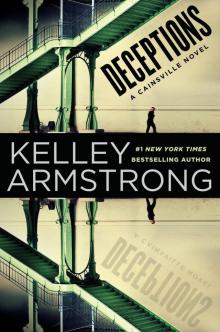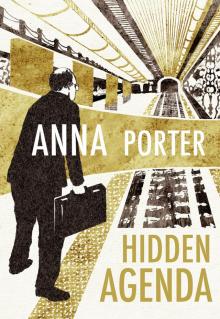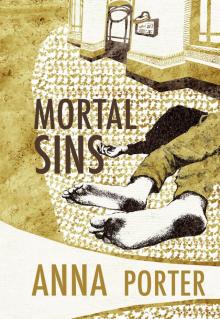- Home
- Anna Porter
Hidden Agenda
Hidden Agenda Read online
HIDDEN
AGENDA
Anna Porter
FELONY & MAYHEM PRESS • NEW YORK
For Cathy and Julia
Acknowledgments
My thanks to John Pearce who thought it could be done, Peter Worthington who planted the idea, Sam Vaughan who edited the first pages, Sylvia Fraser who still doesn’t think mysteries are silly, Jack McClelland who taught me about publishing, Ken Lefolii who read two previous drafts without complaints, Marjorie Harris who might have written this book, and Julian for surviving the whole process.
CONTENTS
Part One JUDITH
Part Two MARSHA
Part Three TORONTO
Part Four LONDON
Part Five NEW YORK
PART ONE Judith
One
NO ONE LIKES TO think about suicides. Least of all, the men who run the subways.
On the night of April 8, 1985, at 11:05 p.m., as his train was rounding the bend in the tunnel just before Summerhill, it was the last thing motorman John Hogg wished to think about. On the downtown run Summerhill and Rosedale are the last of the suburban stations and on a week night almost no one gets on. The yellow lights make the platforms seem unreal. He could slow the train, slide into a fast stop, open and close the doors in almost the same movement, and start again as fast, for sport. Something to keep his mind off that other time. As he pulled out of Summerhill, Hogg began to unwrap his chicken sandwich.
When approaching the next stop, Rosedale, late at night, Hogg always had that same nightmare feeling, fear gripping his jaws tight and catching in his throat. His first suicide had been at Rosedale Station. In the heart of chic, residential old-world Toronto, where he sometimes took the kids for a Sunday drive to show them the palatial, Georgian homes.
Then, also, it had been late at night. The girl in front of the train no more than a blur of movement…
He had to stop thinking about it.
Most drivers didn’t like the late shift, it cut into their family lives, but Hogg had asked for it. And got it. There were a few privileges to be had for twenty-three years on the trains. The kids were grown now, the wife was taking some damn-fool course at Ryerson, and he could get the day to himself. Peaceful. And some nights there were parties. Tonight should be a great one. One of his pals was retiring from the “service” (that’s what they called it, like the army), and they were all getting together. No wives. Just the boys. And he’d heard a rumor someone had lined up a couple of strippers—for laughs.
He was running a few minutes behind schedule, the lights were green all the way, so he moved the speed lever to 75 and took another bite of the sandwich. A little dry. He was coming in fast, past that infernal cut-off where the platform starts…
He felt it before he saw it. A heavy thump-crunch. A shudder as it smashed into the front. Train slowed by the impact. A shoe hit the window at eye level. Brown. Brown spray splattered the glass. He ducked involuntarily before starting to apply the air-brakes. Somebody screamed. Oh god, no, it can’t be. Not here.
“For chrissakes, John, stop the fucking car,” he heard the guard yell into the microphone.
It was only then that he slammed on the emergency brakes, and pulled the train up, wheels shrieking, halfway down the platform. He jerked open his door.
There were three passengers in the front car. A young man, scrambling from the floor. A young woman, white-faced, holding onto the vertical bar with both hands. She looked at him, eyes wide, her mouth sagging open. Another woman was screaming, hiccuping for breath, her head thrown back. Hogg muttered something at the young woman. Regulation: calm the passengers so as to prevent panic. They must stay inside the car until the police arrive.
He reached back into his cubicle and pressed the alarm button, then walked to the first door, withdrew the emergency pass key from his breast pocket and opened it.
“Please, everybody, stay calm. Stay seated. The police will be here in a few minutes,” he said to the man who was moving toward him.
He ran to the emergency alarm station at the end of the platform, broke the glass protection strip, pressed the trip lever down to cut rail power. Then he picked up the red phone, and dialed Transit Control. Dial 555 for suicides.
“It’s a 555 at Rosedale. This is 2454—Hogg,” he added unnecessarily. They would know anyway, as soon as he dialed, where he was and what had happened. They would also notify Police Communications who would direct police officers, ambulance and CIB personnel to the scene.
When Hogg turned, Jake Moore, the guard, was already at the front, bending to look under the train. Hogg jumped down to join him.
“Jeesus, what a lot of blood,” he said. One of the two front fenders was bent and twisted out of shape. “That’s where he must have hit.” Blood splattered all over both fenders, and the lower half of the window. “There he is.” Jake was on his hands and knees, pointing down under the belly of the car. There was an arm sticking out over the inside rail. An arm in a raincoat-sleeve, wrist wearing a gold watchstrap. “He’s got to be dead,” Jake said.
Hogg didn’t say anything, he just nodded. No one could have survived that.
“Didn’t you have another one here a couple of years back?” Jake asked.
“Yeah. A girl… She was just gone fifteen.”
“What foul luck. Twice in the same place.” Jake crouched down again to get a better look under the train.
“Did you see him jump?” he asked.
“No. I mean, yes, I must have. It all happened so fast.”
“I thought you’d never stop the car,” Jake said quietly.
Hogg became aware of other people on the platform, a small cluster with their feet at Hogg’s shoulder level. Silent. Staring.
“Would all passengers please clear the platform,” said the loudspeaker.
“Shit. I had to slow down first, didn’t I? People get hurt if you stop too suddenly,” Hogg blurted out, angry. “Your first one this, isn’t it?”
Jake nodded.
“You’ll learn.”
They climbed back onto the platform.
“There’s been an accident. Everybody please go upstairs,” Hogg said.
“Everybody please clear the platform,” the loudspeaker tuned in.
The spectators backed away, slowly. They made no move toward the stairs.
“Did you see what happened?” one of them asked.
“I saw him when he came down. Such a nice-looking man.”
“Do you suppose he jumped?”
Hogg checked his watch. They were, as ever, efficient, he thought with some pride. The line supervisor was coming along the platform, waving people upstairs. Sensing the authority of the gesture, they began to move. It was 11:18.
Behind the supervisor’s gray uniform, Hogg could see four other men in brown—Equipment Department and Track Patrol.
“You’re Hogg?” the supervisor asked. “Where did it happen?”
“As I was entering the station. He came at me from the side. There was no way…hell, I couldn’t even see him.”
The supervisor scanned the side of the train for pieces of clothing, or body. Two of the other men were down on the tracks looking under the train. None of them were first-timers on the “jumper squad.”
“Under car one. About in line with door one,” a Track Patrol man shouted at the approaching police officers.
“Ambulance here yet?”
“On the way.”
One of the policemen pulled out the emergency wooden box from the south end of the platform, broke the seal and pulled out the basket stretcher, a rubber sheet, and the chalk for marking the location of the body.
The doctor and two St. John’s Ambulance men in white uniforms crawled under the train to determine whether
the man was dead. Not that there was any real doubt. Still, one has to follow regulations; it’s what makes the job bearable.
“He’s dead all right,” the doctor said, emerging from under the car. He wiped his hands on his white coat, leaving black and brown smears alongside the pockets. His face was flushed and damp as a policeman helped him up onto the platform.
“OK, everybody off the track. We’ll have to move the train to get it out,” said the officer in charge. “You the motorman?” he asked Hogg.
Hogg nodded.
In five more minutes they had the body on the stretcher. Most of the body. One arm arrived separately. It had been thrown across the meridian divide toward the Northbound lane.
The back of the head had been smashed. Some soft gray jelly lay beside the face. Blood caked over the forehead, across the neck and down the length of his fur-lined trench coat. The first impact must have broken bones in every part of the man’s body, though all you could see was where his chest had caved in. He was covered in dirt, mud and black tar from the undercarriage. Still, he had been a handsome man. Maybe mid-fifties, hair brown to beginning white, face lined by too many smiles, gray-blue eyes staring up at the doctor’s hand as he closed the lids, firmly.
Sergeant Levine was jotting in his notebook, policeman’s shorthand, while he waited for the CIB photographer. Hogg let him into the first car so he could talk to the passengers. None of them had seen anything, so Levine let them go. The two women were going to take cabs home.
Levine returned to take stock of the man’s personal belongings. The doctor, because regulations said he was the one to do it, had removed the blood-soaked wallet and some credit cards from the breast pocket and a cluster of keys, a pair of kid-leather gloves, gold-rimmed reflector-lens sunglasses, some business cards and a checkbook from the other pockets.
As soon as Levine saw that his partner had finished outlining the position of the body, he turned to Hogg who was waiting beside him.
“How did it happen?” he asked, pencil at the ready, not looking up from his notebook.
“I was coming into the station when he jumped. Must have been standing right by the wall. Couldn’t really see much. Just a blur. Then his shoe hit the window.”
“How fast were you traveling?”
“About 65 and slowing for the station,” said Hogg, a little uncertainly, but who would know anyway?
Levine looked up at the line supervisor: “May as well get your show back on the road. I’ll talk to the other witnesses upstairs.”
“You’d better let Jake Moore take over at the controls,” the supervisor said to Hogg.
“We’ll have a relief crew waiting at Bloor. You guys take what’s left of the night off.” Then he jogged to the end of the platform to call Transit Control and ask them to restore traction power.
The two men with the stretcher were already climbing the stairs.
Hogg went into the guard’s cubicle. Nobody asked any questions. At 11:31 the train was on its way again. Twenty-one to twenty-two minutes, Hogg thought: they’ve got it down to a fine art.
***
Detective Inspector David Parr arrived as the stretcher was leaving. As the officer in charge at Jarvis Street Station on Monday nights he should have been there earlier, but he was in the middle of questioning a particularly hostile assault and battery witness, and gaining momentum, when the call came. The case was coming up for trial within the week, so Parr had decided it wouldn’t matter if he was a little late. Not a hell of a lot you can do for a suicide anyway.
Moving past the stretcher, he flicked the white sheet aside, looked briefly into the dead man’s face, and continued on with a nod to the ambulance men.
“Bloody mess, eh?” he said to the constable who was bringing up the rear. “You’ll notify the coroner?”
“Yes, sir,” the constable said. “Sergeant Levine was taking inventory.”
Parr waved him on and went to stand beside Levine at the edge of the platform.
“All over?” he asked cheerfully.
“It is now,” Levine said, as one of the men in brown overalls scrambled up over the lip of the platform and handed him a highly polished tan leather shoe. Levine turned it over; it had hardly been worn. “Good as new,” he said. “Look at that.” He pointed to the gold printed label inside the shoe. “A Gucci, yet. Why anyone with a pair of brand new Guccis would want to throw himself at a moving train, I’ll never know.”
The supervisor came over to tell them he was letting people through at the top again. The two policemen fell in line behind him as he started up the stairs.
“Who was he?” Parr asked.
Levine shrugged. He handed over the plastic bag with the contents of the pockets, holding it between thumb and forefinger as if it were some nasty insect.
“Here,” he said. “You can have the shoe too. Pick up its mate over at the morgue. He won’t need them. Not where he’s going.”
“Perks go with the job, eh?” Parr smiled as he rummaged through the contents. “Here we are.” He pulled a driver’s license out of the wallet. “George Harris, sixty years old. Lived at 24 Rose Hill Drive. That’s not far from here.”
“You’ll be going over there tonight?” Levine asked.
“Yes. Soon as this is over.”
“Don’t you ever do it by phone?”
“Not if I can help it,” Parr said quietly. “I sure as hell wouldn’t like to be told on the phone. Would you?”
The supervisor interrupted them, opening the door to a small staff room near the Yonge Street exit.
“There were only six people on the platform,” he said. “They’re all in here.”
“Good evening.” Parr smiled encouragement as he entered. “We won’t want to keep you long. Just a few questions and you can all be on your way again.”
Six faces glared at him, silent. In shock, Parr thought. Suicides are damned unsettling.
In the corner, a kid about twenty with short-cropped, greased brown hair, leather jacket, tight blue jeans, scuffed leather boots, not quite punk but thinking about it. He held hands with a girl, same age, long damp hair, pale pinched skin. She huddled close to him, touching his body with hers. She seemed docile and needy. He was defiant. At his age, that was fashionable.
By the window there was a black woman, late fifties, soft felt hat pulled down low over her nose, worn khaki raincoat too narrow and too short, orange Dacron dress. She was holding a white supermarket shopping bag, her arms wrapped around it. She looked scared. Might have weathered some bad times with the law; more likely, she was an illegal.
A man, about thirty-five, sat uncomfortably straight-backed at the narrow table, an ashtray in front of him, his briefcase tucked between his navy-blue lace-ups. He wore a three-piece negotiating-blue suit, tinted rimless glasses, and was smoking his third cigarette. He had an exceptionally thin long neck with a jumpy Adam’s apple tucked into his tight white collar.
The other end of the table was occupied by a man in his forties—balding, red-faced—and a pinched, matronly woman, possibly English. Clearly they were not together. They were a study in contrasts. She had half-turned away from him, balancing her outsize monogrammed handbag against the table leg. She wore a black mink coat, casually unbuttoned, her elegant knees composed over each other, foot tapping in anticipation. The man was sweating. He took a crumpled Kleenex from his lumberjack shirt pocket, shook it out, and wiped his forehead.
Levine flicked open his notebook.
“Could we please have your names and addresses. Police procedure, I’m afraid,” he said deferentially. “Perhaps you’d like to get the ball rolling.” He turned to the executive type, who was closest.
“Joseph Muller, 27 Roseborough,” he said, shaking another cigarette out of the package. “Do we get called for an inquest or something?”
“I don’t think that will be necessary,” Parr said. “Phone number?”
Levine wrote down both the home and business numbers. A stockbroker going
home late. Edgy.
“When did you arrive on the platform?” Parr asked.
“Couple of minutes before the train. I wasn’t even near him when he jumped…”
“Did you see him jump?” Parr asked quickly.
“Well… I sort of saw a movement, out of the corner of my eye really. Then there was this awful thud.”
“Was he already on the platform when you came down?”
“I don’t know, really. I don’t remember. I was reading the paper.” He waved his rolled-up Star at Parr.
Parr thanked him and opened the door to let him out before turning to the others.
The apprentice punk hadn’t seen anything. Nor had the girl. It was the thud she remembered. Her lower lip trembled when she spoke. While Parr questioned them the boy was pumping her hand, his eyes steady with hostility.
“Get them out of here,” Parr murmured to Levine.
The man in the lumberjack shirt said he was a cab driver named Jenkins, taking a day off. “Teach me to take the gawd-damned train,” he grumbled. He had seen Harris march to the edge of the platform, lean out to look up the track when they heard the train coming, then back up as if to get out of the way. But he didn’t. He had sort of lurched forward again and fallen in front of it. Somebody screamed.
“Who?” Parr asked, but none of the remaining passengers admitted to screaming, so he went on with the questions.
The black woman, not unexpectedly, had heard nothing and seen nothing. She was so eager to get away Parr could feel her vibrating toward the door. He hoped they wouldn’t have to call her or that she had given a false address. He wasn’t going to harass her for identification. Rotten luck for her to be in the wrong place at the wrong time.
They had left the gray-haired woman to last. She seemed content sipping her tea, listening with grave interest, like a schoolteacher watching the class take turns at reading. That is what she turned out to be: Mrs. W.A. Hall, a retired schoolteacher. The husband must have made the money.

 Deceptions
Deceptions Hidden Agenda
Hidden Agenda The Appraisal
The Appraisal Mortal Sins
Mortal Sins In Other Words
In Other Words